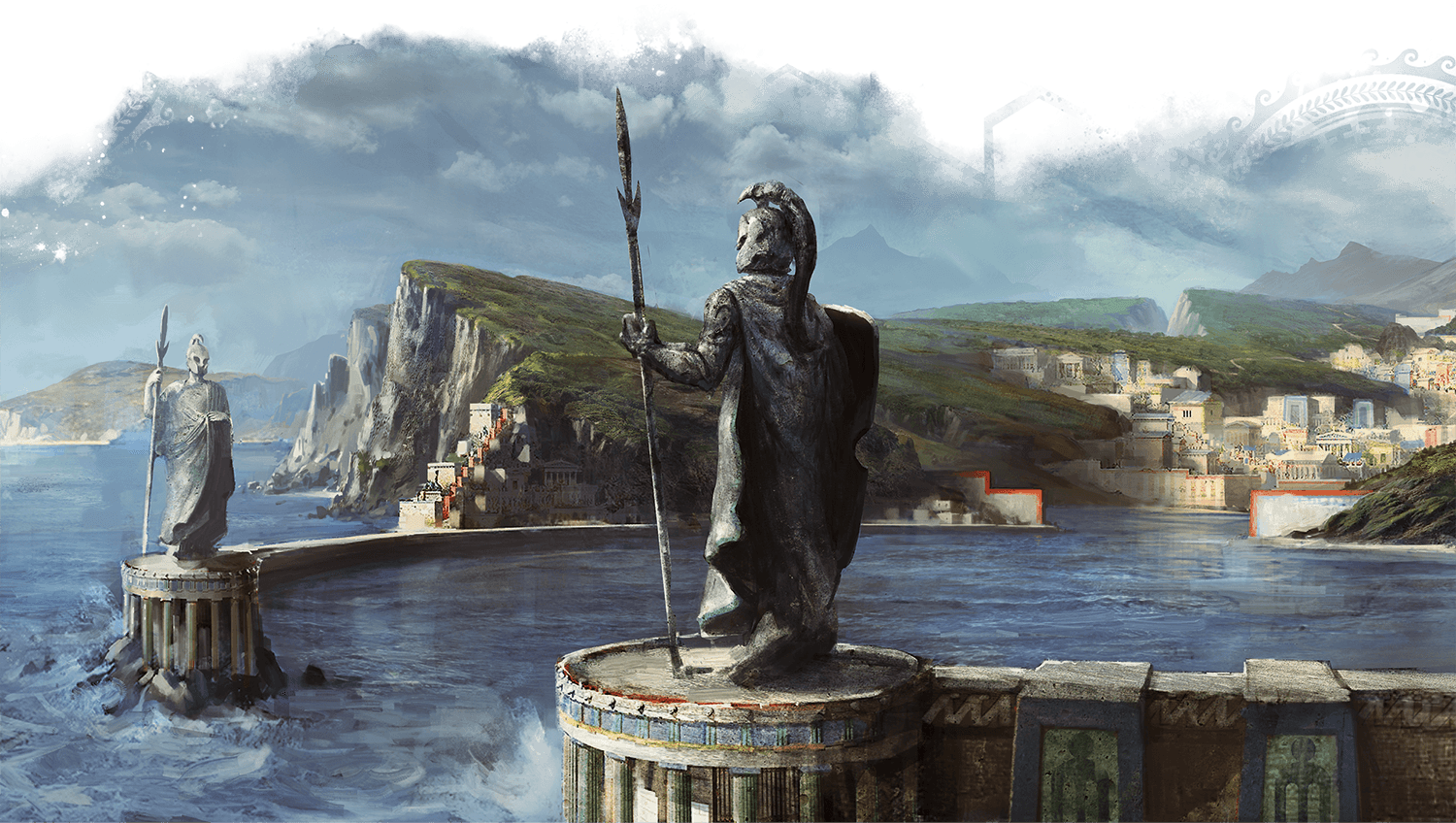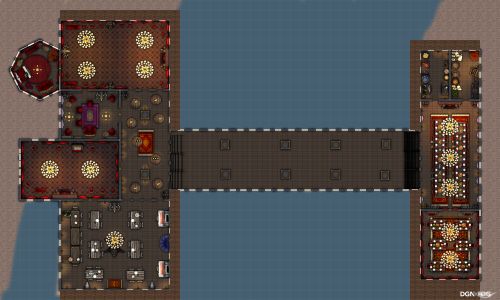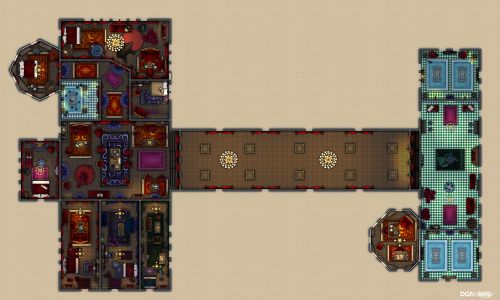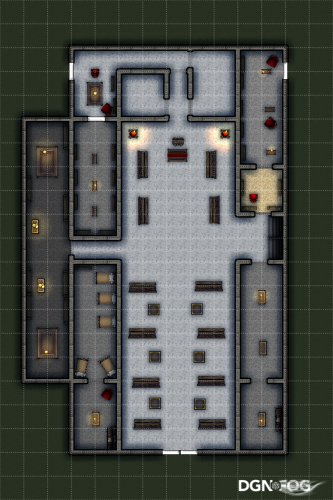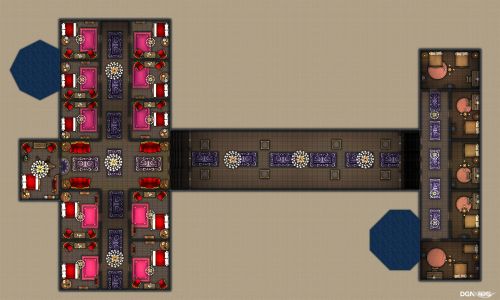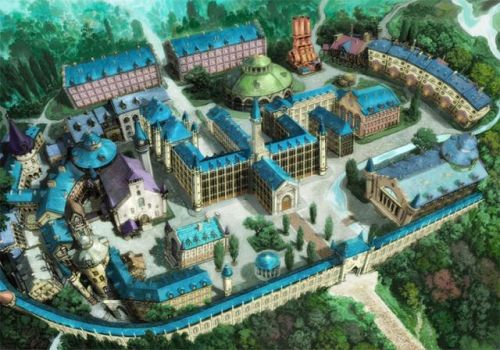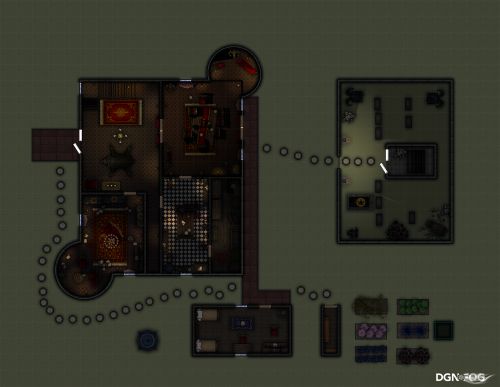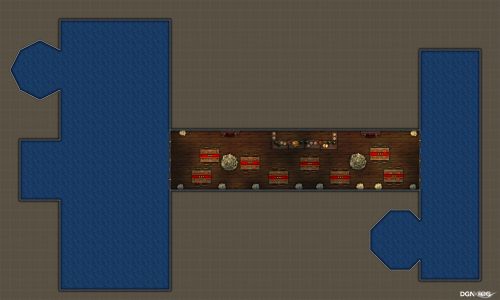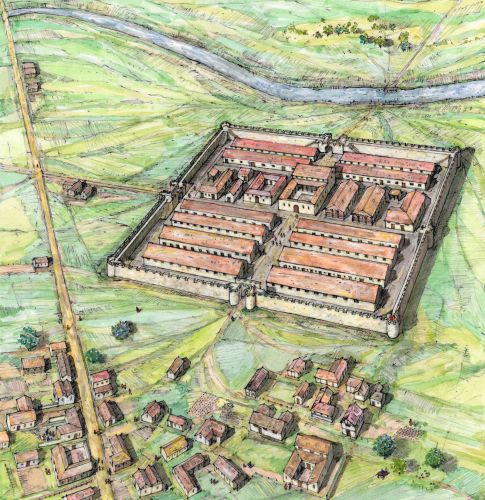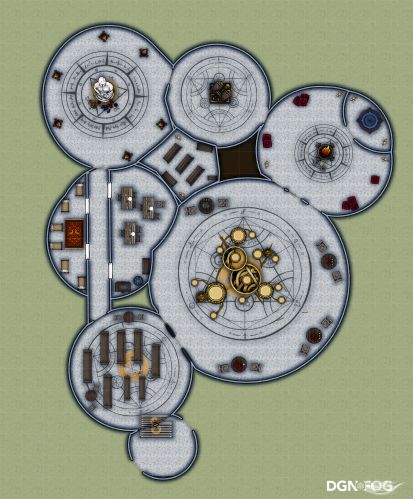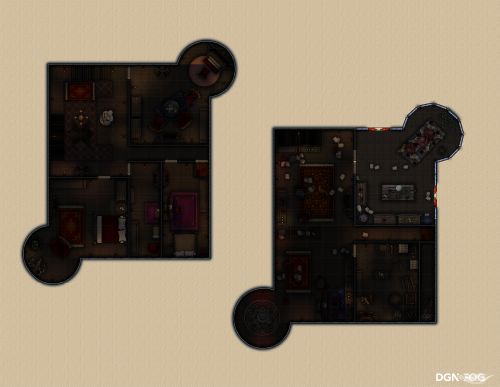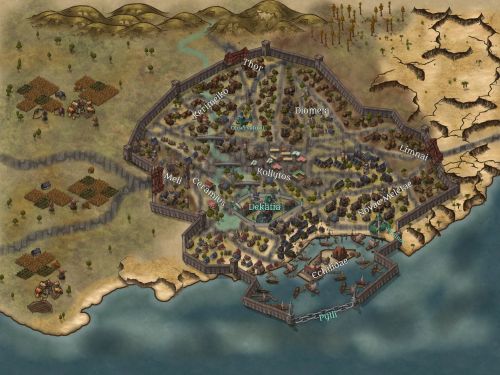Meletis
Meletis is a polis devoted to learning, magic, and progress. It is the most populous city-state and home to progressive thinkers, pious thaumaturges, and wise oracles. Born from the defeat of tyranny, to this day it pursues the ideals of free thought, societal betterment, and reinvention over stagnation and totalitarianism.
The archon Agnomakhos ruled the area that is now Meletis for centuries. Impressing those he conquered into his legions, Agnomakhos aggressively expanded his empire, spreading it as far as the forests to the east and the mountains to the north. Ultimately, though, the heroes Kynaios and Tiro overthrew the archon. From the empire’s ruins rose Meletis, a land that endeavors to reject cruelty and oppression throughout the world, and guards against hypocrisy within its own borders.
For a time, Kynaios and Tiro ruled Meletis, striving to govern in accordance with the highest philosophical and ethical principles, which ultimately led them to relinquish their power and establish a philosopher-led republic. After the kings’ deaths, the council of scholars known as the Twelve took up rule of the polis, with the sage Elpidios serving as the senior member.
To the people of Theros, “Meletis” is more or less synonymous with “Meletians”—the polis isn’t just the people who live in the city of Meletis or even those who dwell in nearby villages; it is the people who follow the Meletian way of life, wherever they might be found.
In every polis, civic responsibility and full protection are afforded only to citizens. Citizenship is limited to those whose parents were both citizens of the polis. Citizens of other poleis, and their children, aren’t permitted to participate in the government of the polis.
Structure
The Twelve
A council of philosophers called the Twelve serves as the ruling body of Meletis. They are elected by popular vote among the citizens of Meletis and serve for terms of four years at a time. They are supposed to govern by philosophical principles of justice and social order, and many of them do strive to uphold the highest ideals in their decisions. Others are more grimly realistic, and a few are deeply corrupt, serving only their own interests. The most senior member of the council is recognized as its leader, responsible for bringing the assembly to order and moderating its debate. Currently, this position is held by the renowned philosopher and orator named Perisophia.Culture
People of Meletis
The people of Meletis take pride in their city’s grand architecture, especially the great temples to the gods. They value philosophy and other intellectual pursuits, especially the practice of magic. Meletis’s army is known for its discipline and its piety, and its navy is unparalleled. The city observes every one of the gods’ holy days in various ways, and most residents try to live as the gods demand. Rich fields and the bounty of the sea support most people throughout Meletis. The people have reputations for being accomplished weavers, skilled sailors, and cunning merchants. Books and literacy are also common throughout the land, and the work of scribes, cartographers, musicians, and storytellers is well regarded. The people of Meletis believe themselves to be the inheritors of a heroic tradition, and each person owes it to themselves and to society to strive for greatness. Beyond Meletis’s common folk, a few groups that hold noteworthy standing are detailed here.Philosophers
Though they aren’t necessarily heroic, philosophers are highly valued in Meletis, which is renowned as the center of philosophical thought. They form a privileged class, often coming from wealthy families but also supported by stipends from the polis’s academies and their own students. Different philosophical schools hold political as well as intellectual power in the polis, with five schools of philosophy dominating Meletian discourse. Elpidians. Perisophia’s optimistic Elpidian school currently predominates Meletian thought and politics, carrying on the works of the heroic Epharan oracle Elpidios. The Elpidian school strives to put magic and philosophy to use in improving the lives of all Meletians. Elpidian mages embrace magic in all its forms. Formalists. Formalist philosophers believe in a realm populated by abstract entities such as numbers and theories. They focus their efforts on trying to improve the moral fabric of the polis, hoping to create the ideal society, where people live together in peace, and where war and crime disappear. Uremideans. This school emphasizes logical reasoning, rhetorical excellence, and theories of ethics and virtue. Uremideans are eminently practical governors who seek to balance ethical ideals and realistic necessities. Nykleans. Nyklean philosophers teach that reason or destiny underlies all of reality, so that everything that takes place must unfold just as it does. These philosophers train themselves to accept and endure whatever befalls them, enjoying good fortune but not grieving its loss. Anapsians. Anapsian philosophy embraces the fine delights of life: the pleasures of love and friendship, fine food and drink, art and music. Anapsians have few strong opinions about governance, except that an ultimate good end should be kept front of mind in all decision.Thaumaturges
Meletians view magic as one of the greatest art forms, and they call the most accomplished mages thaumaturges (“wonder workers”). Many Meletian mages are trained at the elite academy of the Dekatia, but countless smaller schools and private tutors teach the magical arts. These lessons in magic typically include a well-rounded education in the sciences and philosophy. Some thaumaturges find their magical studies aligning with popular Meletian philosophies and choose the schools of magic they focus on based on such teachings. The mark of a true thaumaturge, though, is a gift or positive omen from the gods; even the most accomplished student of magic can’t earn the title without such a sign of divine approval. One mage might receive the gift of a spear from Heliod, another could receive a clockwork owl from Ephara, and still another might experience a wild, creative vision from Keranos.Nonhumans in Meletis
Meletis strives to be a beacon to all of Theros’s people. Well-intentioned members of any culture are welcome on Meletis’s streets, and the polis’s people work to earn the trust of their neighbors. Of all the poleis, Meletis has the closest relationship with the tritons of the Siren Sea. Several communities of tritons consider the harbors of Meletis and secluded coastal sanctuaries their home. Many take part in work near and under the water that other peoples are ill-suited to, but increasingly tritons find work not related to the sea, with triton restaurants, chemists, and members of the Reverent Army being increasingly common. Meletis maintains a fragile peace with centaurs of the Lagonna band, engaging in regular trade. It’s not uncommon for small groups of centaurs to set up shop in the polis market for short periods, though few spend more than a night or two in the city, most finding it claustrophobic at best. Few leonin journey to Meletis, knowing little of the land beyond what their stories remember of Agnomakhos’s tyranny. Even an age after the archon’s rule, most leonin view Meletis as a cursed place. Those few who have traveled to the polis in recent years find it changed, with great potential for trade and cooperation, but no Meletian or leonin has yet initiated an official dialogue between the two peoples. Most satyrs have little patience for Meletian philosophy, visiting largely out of curiosity or on elaborate larks. Minotaurs are rarely seen in Meletis, though those who visit with peaceful intentions are welcome.Public Agenda
The work of Meletis is to be a welcome polis of advancement and high learning where people can embrace their highest gifts and pursue ultimate knowledge and community.
Assets
harbor with access to the sea, buildings, troops, ships and horses, academy, temples, prized book and magic shops.
History
MYTH OF THE FIRST KINGS OF MELETIS
In ages past, the peoples of what would one day become Meletis were ruled by the archon tyrant Agnomakhos. Unchecked for generations, the vicious overlord carved out a mighty empire. Willing to endure the immortal’s cruelty no longer, the heroes Kynaios and Tiro—united by their love of freedom and one another—rose to challenge him. So, when the heroes Kynaios and Tiro sought to inspire an uprising, few flocked to their banner. Undeterred, the rebels soldiered on against impossible odds. Seeing their dedication to the cause of freedom, the goddess Ephara came to the heroes. She offered to aid Kynaios and Tiro in their battle against the tyrant, supplementing their martial skill with a new weapon: magic. With their new power, Kynaios and Tiro inspired the people to rise up against Agnomakhos, ultimately defeating his armies and striking the archon down. From their victory rose the polis of Meletis and the use of magic among mortals. The people rallied to their cause, and through the strength of arms, magic, and devotion, they defeated Agnomakhos. The polis of Meletis rose from the ruins of the archon’s empire, established as a beacon of freedom and enlightenment, and its people chose Kynaios and Tiro to be its first kings. Agnomakhos’s fall remains a point of honor in the minds of Meletis’s people, a moment immortalized in relief upon countless civic buildings throughout the polis. The joint tomb of these Kings is in Oxus.Territories
Features of Meletis
The architectural and academic marvels of Meletis testify to the achievements of civilized humanity. The streets are paved with bricks made in interlocking geometric shapes, meant to demonstrate principles of both mathematics and magic. Grand temples line the streets, testifying to the Meletians’ devotion to the gods. These rise as both mighty bastions dedicated to individual deities and various neighborhood shrines devoted to the pantheon as a whole. Inside the city, the wild lands feel like a remote threat. Perils from the sea present more obvious dangers, but a great sea wall protects the polis’s port on the Bay of Meletis, while a lengthy channel cuts through the surrounding land to reach Meletis Harbor on the Siren Sea.Pyrgnos
Many Meletians speak of the “edifice of knowledge,” referring in the abstract to the sum of all learning and scholarship. Every citizen is expected to help improving this edifice for the good of the polis, whether through philosophical exploration, advancements in magical technique, investigation into the nature of the gods, or perfection of techniques in crafting and trade. But the edifice of knowledge in Meletis is a literal structure as well as a metaphorical one: the Pyrgnos is a glowing stone tower standing near the coast. It is literally formed from the collected learnings of the polis, recorded on carved stone tablets and glowing letters hovering in the air. At night, the Pyrgnos shines like a lighthouse where the sea wall meets the shore, gleaming on the waters of the Siren Sea. A decade ago, the Pyrgnos was partly demolished by a kraken that attacked the city, but it has been repaired and continues to grow, reflecting the continued learning of the polis’s citizens.The Dekatia
Meletis boasts many centers of learning, but the preeminent academy for philosophers and mages is the Dekatia. Students who display remarkable promise over the course of their earlier education can go on to spend up to ten years in arduous training at the Dekatia, apprenticed to master priests, thaumaturges, philosophers, and military heroes. Those who manage to complete this decade of training are renowned as the wisest of the wise and the bravest of the brave, combining all the essential learning of the polis into one heroic package.The Observatory
The Observatory is a tall viewing platform and a windowed structure offering a splendid view of the sky, renowned as a place to study Nyx, the home of the gods. Special crystals shaped by thaumaturges and blessed by the oracles of the gods enhance the view, making it easier for observers to see the workings of the gods among the stars and constellations. Priests, mages, and philosophers interpret what they see in the Observatory as signs and omens from the gods.Military
The Reverent Army
The hoplites of Meletis practice battlefield tactics in an environment saturated with religious devotion. The military force of the polis is called the Reverent Army, and aims as much to exalt the glory of the pantheon as to defend Meletis. The soldiers are clever and resourceful, believing their piety leads the gods to smile upon them. More likely, though, their extensive training in battlefield tactics and magic gives them an edge over other soldiers, with most Meletian hoplites knowing at least a little magic.Technological Level
Highly advanced populace with philosophy, maths, art, the sciences, astronomy, rhetoric, religion
Foreign Relations
Trades often with Akros and Setessa, as well as being one of the few places to trade with the satyrs, leonin, centaurs, and minotaurs.
Agriculture & Industry
Beautifully advanced farms in the outskirts and several markets and shops that sell food, spices, medicine via an apothecary, and booksellers. extensive husbandry, honey production, fishing staple, incredible avian messengers.
Trade & Transport
Meletis’s Surroundings
Meletis sits on the coast of the Siren Sea, surrounded by rivers, sparse woodlands, and vast, stepped grasslands. Fields of barley provide sustenance to Meletians and their animals. Well-trod roads wind their way through the region, but most locals travel along the coast in simple boats.Meletian Holdings
The polis of Meletis embodies the heart and mind of what it means to be Meletian, but the polis’s lands also includes numerous other settlements and wildernesses. The people who live in these holdings are no less Meletians than the inhabitants of the city, and they share the values of other Meletians even if their lifestyle affords them little opportunity to study magic and philosophy. Altrisos. This small walled city is famous for Ephara’s intervention to protect it from a kraken, her face coming to life on the marble wall and making the barrier grow so tall that the kraken couldn’t get through. Altrisos now has Ephara’s face on nearly every building and wall in the entire city in gratitude. Glossion. Glossion is a small coastal town that would be completely unremarkable, except that it’s accumulated a truly impressive library. The bulk of the town’s economy revolves around maintaining the library and meeting the needs of travelers who come to visit it. Krimnos. Renowned as the home of Anapse, the philosopher who founded the Anapsian school, the village of Krimnos attracts many philosophers who share Anapse’s delight in the pleasures of a simple life. Listes. Listes is a fortress marking the northeastern border of the polis. The civilian population is hardly less disciplined than the members of the Reverent Army stationed there, and the whole population observes Iroas’s holy days together. Natumbria. The residents of Natumbria are famous for training sea animals as skillfully as Setessans train land and air animals. They train sea snakes, dolphins, and even sharks on a few occasions to be combatants, working animals, aquatic mounts, and companions. Neolantin. Though they are regarded as Meletians, the people of Neolantin view themselves as citizens of Olantin—a coastal polis that long ago vanished into the sea. According to legend, an angry Heliod smote the polis with his spear, sinking it in punishment for its people’s utter hubris. The fact that the Neolantians were spared this fate, they say, is evidence of their humility, and they take special care in their sacrifices to Heliod. Oxus. Oxus is a quiet town with a notably wealthy population, consisting largely of merchants who have retired from trade with large fortunes at their disposal. The tomb of Kynaios and Tiro also stands in the center of the town, the subject of many local legends. Phaela. A small fishing village, Phaela is most noted as being the literal “end of the road” for travelers venturing south from Meletis. The rugged lands beyond are rocky and scattered with forgotten ruins. Sitrium. This coastal town is known for the way many of its buildings are on stilts to accommodate the changing tides. Sitrium is famed for its skilled shipwrights. Thesteia. The village of Thesteia is little more than a crossroads, but it’s notable for its temple to Karametra. The site draws farmers from the region who offer a portion of their crops to the god of agriculture.Lagonna Grounds
At the northern edge of Meletian territory, between the sea and the Nessian Wood, roam the centaurs of the Lagonna band. Unlike the ferocious Pheres band, the Lagonna-band centaurs are generally peaceful and don’t engage in raids upon Meletian territory. They are frequent visitors in Listes, Krimnos, and Meletis itself, and often carry goods between Meletis and Setessa, since they are more at home in the Nessian Wood than most Meletian merchants.Education
Many citizens of the polis are educated through general philosophical and general education tutors and smaller primary schools. They can, and usually do, go on to pursue magic and philosophy at the local schools and some become highly advanced practitioners.
Infrastructure
Aquaducts, sewage, brick roads in intricate magic and mathematic symbols, towers, bridges, town halls, walls, schools, an observatory
Evil flourishes where ignorance thrives.
Maps
-
The Third Tower
-
The Third Tower Second Floor
-
Woods of Krimnos- Apothecary
-
Graveyard Temple
-
The Third Tower Third to Seventh Floors
-
The Dekatia Academy
-
Natumbria
-
Valentyne Manor
-
The Third Tower Top Floor
-
Listes- The Reverent Army Stronghold
-
Dekatia Academy's Oracular Conflux
-
Valentyne Manor 2nd & 3rd Floors
-
Map of Meletis
Type
Geopolitical, City-state
Training Level
Professional
Veterancy Level
Veteran
Demonym
Meletians
Leader Title
Head of State
Government System
Democracy, Representative
Power Structure
Autonomous area
Economic System
Mixed economy
Currency
copper, silver, gold
Major Exports
Woodworks, writings and philosphy, seafood and shell materials
Major Imports
weapons, armory, spices, fabrics
Legislative Body
The Twelve
Judicial Body
The Twelve
Official State Religion
Subsidiary Organizations
Deities
- Athreos, god of passage
- Ephara, god of the polis
- Erebos, god of the dead
- Heliod, god of the sun
- Iroas, god of victory
- Karametra, god of harvests
- Keranos, god of storms
- Klothys, god of destiny
- Kruphix, god of horizons
- Mogis, god of slaughter
- Nylea, god of the hunt
- Pharika, god of affliction
- Phenax, god of deception
- Purphoros, god of the forge
- Thassa, god of the sea
Location
Controlled Territories
Manufactured Items
Notable Members
- Argiris Rodinotis, Owner of the Full Pot
- Aristarchos Lilloulis Owner of the Third Tower
- Aristeidis Headmaster of the Dekatia
- Effrosyni Sotiralli- Leonin Mayor of Natumbria
- Filippa Karahaliakou- Owner of the Intelligent Pen
- Hristos Laskaroglou- General of Reverent Army
- Kelitia Owner of the Brass Basilisk
- Meelos Order of the Scribes
- Melpomeni Rubouli- Mayor of Sitrium
- Menelaos Dellotis- Mayor of Altrisos
- Nefeli Andreli- Mayor of Neolantin
- Perisophia- Head Sage of the Twelve
- Platon Boosaliades- Mayor of Glossion
- Sergios Giannakos- Owner of the Different Sign
- Thanassis Toccilis- Overseer of the Observatory
- The Triumvirate of Oxus
- Theonymphi Remakou- Owner of the Mystic Mythic
- Thomas Nassotis- Mayor of Krimnos
- Zoi Zervou- Smith of Meletis Metal Trades
Related Plots

